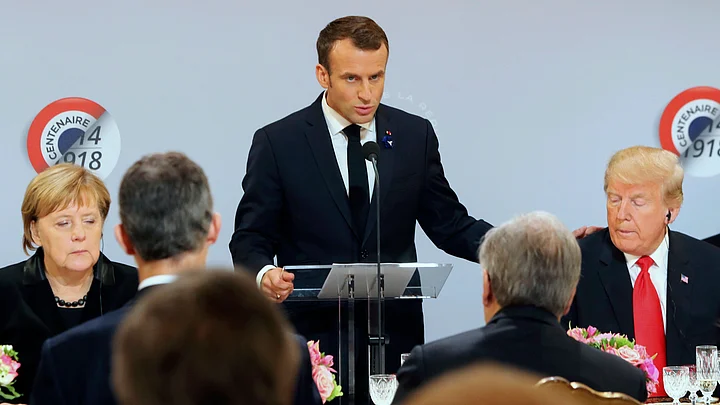World leaders gathered in the driving rain in Paris on Sunday to mark 100 years since the end of World War I, with host Emmanuel Macron warning against nationalism at a time of growing strain between Europe and Donald Trump's America.
Around 70 leaders including US President Donald Trump and Russian President Vladimir Putin marked the centenary of the 1918 Armistice in the French capital at 11 am local time (3:30 pm IST).
After church bells rang out across France, the leaders sat together at the Tomb of the Unknown Soldier at the Arc de Triomphe for a memorial that included a performance by star cellist Yo-Yo Ma and the reading aloud of letters by WWI soldiers.
Macron delivered a 20-minute speech that called on his fellow leaders not to forget the lessons of the past and worldwide hopes for peace.
Ruining this hope with a fascination for isolation, violence or domination would be a mistake for which future generations would rightly find us responsible.Emmanuel Macron
He also delivered a stinging indictment of nationalism, calling it "the exact opposite" of the patriotism shown by soldiers.
Nationalism is a betrayal.
"By saying our interests come first and others don't matter we are erasing what makes a nation precious, what makes it live, what makes it great and most importantly of all, its moral values," he said, watched by Trump who prides himself on being called a nationalist.
Trump, whose hardline nationalism has badly shaken the Western alliance, arrived in Paris on Friday criticising host Macron for being "insulting".
Trump took umbrage at a recent interview in which Macron talked about the need for a European army and cited the US, along with Russia and China, as potential security risks.
During talks with Trump Saturday Macron said his remarks had been misinterpreted and that he was merely saying Europe needed to take greater ownership of its own security.
The service concluded with the bugle call that was played at 11 am on November 11, 1918 to signal the end of fighting on the Western Front.
Elsewhere, ceremonies in New Zealand, Australia, India, Hong Kong and Myanmar began a day of remembrance services around the world for a conflict that involved millions of troops from colonised countries in Asia and Africa.
About 70 current-day nations were involved in WWI, which had six empires and colonial powers at its heart: Austria-Hungary, Britain, France, Germany, Russia and the Ottoman Empire.
Around 10 million soldiers are estimated to have been killed during the fighting and more than double that number wounded.
Between five and 10 million civilians are estimated to have been killed.
(This story has been edited for length. It has been published in an arrangement with PTI.)
(At The Quint, we question everything. Play an active role in shaping our journalism by becoming a member today.)
